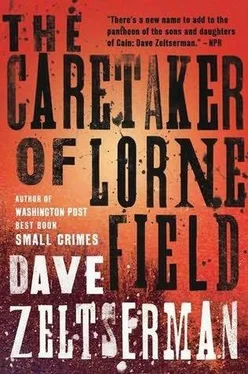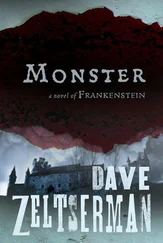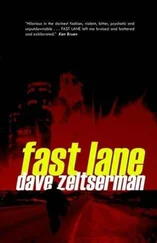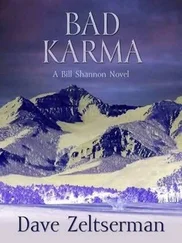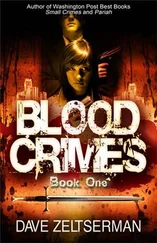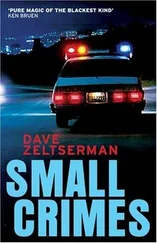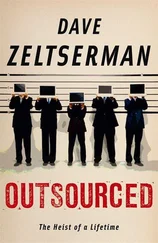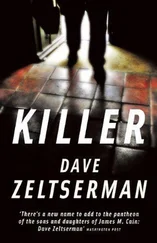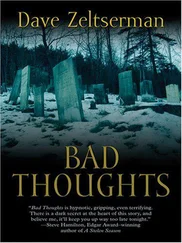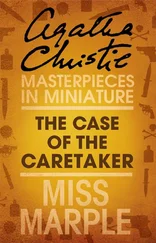When he was two miles away from the cabin he remembered that he had forgotten the aspirin again. He thought about turning back, but decided if he did he’d never make it back to Lorne Field by morning.

Jack Durkin tried setting up some bedding on the floor of the shed, but couldn’t stand the cramped quarters. Boards from the wood floor dug into his back and it was unbearably hot and stuffy. After a while, he realized there was no reason he couldn’t camp outside instead. It wasn’t raining, and no bugs or critters came within a half mile of Lorne Field. He pulled the blankets and sheets and pillow outside and set up behind the shed so he wouldn’t have to see the field. It was completely still out there. No crickets chirping, no insects buzzing, absolutely nothing but a dead quiet, interrupted only occasionally by the groans that accompanied his restless movements. He wished to hell he had remembered the aspirin. He also prayed his ankle was only sprained and not broken. As it was he left his work boot on his injured foot. He knew if he took it off he’d never get it back over the ankle in the morning.
Earlier he had organized the food he brought, and if he was careful he would have enough for three weeks. First frost was four weeks away. Maybe it would come early. Whatever happened, he wanted to be prepared to last the season in case things dragged out with Hank’s litigating.
Once he was camped outside, he could only sleep fitfully for a few minutes at a time before either the hard ground or his ankle woke him. At one point he got up and loosened the ground with the spade. It didn’t help. Within minutes of tossing and turning, his weight packed the ground hard again. He’d have to stop by the Army Surplus store the next day and see if Jerry Hallwell could loan him an air mattress.
After a few hours he couldn’t take the hard ground and his throbbing ankle any longer and slowly rolled onto his knees. Using the shed for support, he pulled himself to his feet. He tottered for a moment, and grimaced as he tested his ankle.
The sun was hours from appearing in the sky. It wasn’t quite dark, wasn’t quite light either. More of a murky gray-ness. Looking through it was like looking through a fog. Jack Durkin squinted at his watch and saw it was only four twenty-nine. He hobbled past the shed and looked over the field. It was completely dead, and it would probably be another couple of hours before the first wave of Aukowies pushed their way through the dirt. He stood transfixed by the emptiness of the place and the eerie stillness of it. After a few minutes, he turned away from the field and made his way into the shed. He opened a can of baked beans and ate it cold for breakfast. Then he waited until the Aukowies appeared.
The day of weeding was the hardest he ever had to endure, even harder than the two weeks when he had pneumonia. Maybe it was because of his injured ankle, but he felt feverish and all day alternated between sweating profusely and shivering in the eighty-five-degree heat. He was only able to complete two passes of weeding with each one taking over seven hours. The Aukowies sensed that he was injured. He could see their indecision as they were torn between playing possum or acting more boldly, but they chose to keep playing possum.
He couldn’t carry the canvas sack on his back. Once the weight of the Aukowie remains reached twenty pounds, the canvas sack would collapse him to his knees. He ended up having to cart it around in the wheelbarrow.
He had started weeding early-as soon as the first wave of Aukowies broke through the field-but it was still after sundown before he finished the second pass. He looked over the field and saw small Aukowies covering the first half of it. He decided to let them wait, that he’d start early the next morning and get to them then. After he burned the pile of Aukowie remains and buried their ashes, he ate a can of sardines and wearily mounted Lester’s mountain bike and headed towards town in the hopes of obtaining an air mattress from Jerry Hallwell’s store.
It was past ten by the time he reached the town center. The Army Surplus store was already closed for the night, as was the town drugstore. Somehow he’d have to leave the field earlier the next day so he could get an air mattress. Earlier when he had passed the Caretaker’s cabin he saw that his belongings had been taken away as Hank had promised, so if he wanted aspirin he was going to have to ride out to the all-night supermarket. Every muscle in his body ached, and his ankle hurt to the point where he was fantasizing about chopping his foot off. He needed aspirin badly, and he needed to sleep on something other than hard ground.
He dialed Hank on a payphone outside the town drugstore. As the phone rang he thought about Hank’s offer to put him up. He found himself wondering again about that offer. Maybe one night wouldn’t be so bad…
Hank Thompson’s wife answered the phone and curtly asked who was calling.
“Hello, Jeanette, this is Jack Durkin. I know it’s late, but can I speak to Hank?”
“No.”
There was a sharp click as she hung up.
Durkin stared at the receiver befuddled. Even though he had recognized Jeanette’s voice, he still couldn’t help wondering whether he had dialed a wrong number and talked to someone who only sounded like her. He dug out change from his pocket for another call and tried Hank’s number again. On the third ring Jeanette answered, a chill coming from her voice as she demanded to know who was calling.
“Jeanette, I know it’s late and I apologize,” Durkin said, his words tumbling out in a rush. “But I know Hank’s expecting me to call-”
“My husband’s dead,” Jeanette Thompson said. “He died last night from a massive coronary, in no small part due to the agitation your hysteria caused him.”
She hung up the phone again.
Durkin took several steps away from the phone, dazed, and then stumbled back to it. He searched his pockets, found enough change for another call and dialed Hank’s number again. When Jeanette Thompson picked up, he told her how sorry he was about Hank. “Your husband was a good man,” he said. He stopped for a moment to collect his thoughts. On the other end there was only a stone-cold silence.
“I know this is bad time to be asking this,” he said, “but Hank had things of mine that are important. A contract and a book. I need to get them back-”
“Yes, Mr. Durkin,” she said harshly, “this is a bad time for you to be asking me for anything. I saw my husband die last night. I spent today arranging his funeral. If you want those items returned, call me back in a week, and if they haven’t been disposed of, I will see that they are returned to you. If you call back before then I will make sure those items are thrown in the trash.”
She hung up again.
Durkin took several steps away from the payphone and sat down on the curb with his head in his hands. He had never felt more lost. He sat for a long moment, wondering how he was going to save the world without Hank’s help and cursing himself for letting the contract and Book of Aukowies out of his possession. But what difference did it make? Let her throw it away. He was no longer Caretaker, so what difference did any of it make?
He thought of his pa and his grandpa before him. How weeding that field turned them both into old men before their years. How they were both in their early fifties when they died, only a few short years after retiring as Caretaker. He thought about how much they had sacrificed of themselves. He thought about how much he himself had sacrificed.
There was a reason for all of it.
He steeled himself and fought against the despair crashing down over him. What he did was too important to let his feelings overwhelm him.
Читать дальше
